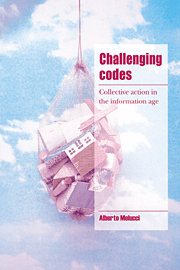Book contents
- Frontmatter
- Contents
- Preface and acknowledgements
- Introduction
- Part I Theory of collective action
- Part II Contemporary collective action
- 5 Conflicts of culture
- 6 Invention of the present
- 7 The time of difference
- 8 Roots for today and for tomorrow
- 9 A search for ethics
- 10 Information, power, domination
- Part III The field of collective action
- Part IV Acting collectively
- References
- Index
5 - Conflicts of culture
Published online by Cambridge University Press: 23 November 2009
- Frontmatter
- Contents
- Preface and acknowledgements
- Introduction
- Part I Theory of collective action
- Part II Contemporary collective action
- 5 Conflicts of culture
- 6 Invention of the present
- 7 The time of difference
- 8 Roots for today and for tomorrow
- 9 A search for ethics
- 10 Information, power, domination
- Part III The field of collective action
- Part IV Acting collectively
- References
- Index
Summary
The systemic field
Societies of mature capitalism; postindustrial, postmaterial, complex societies – none of these labels seems capable of capturing the substance of the transformations under way in the global society. Nor can they indicate to us the direction of the developments affecting the social system in which we live. That these labels, and many others, nevertheless seem unavoidable and have been adopted in diverse use is a sign of the fact that we do not really know, except in negative terms, what exactly it is we are talking about. In this situation, we should declare outright that we are trapped in an analytical and linguistical impasse which has left us wavering between, on the one hand, an outdated, if not wholly anachronistic, stockpile of terminology that we still employ in the absence of new cognitive tools, and, on the other hand, a set of allusive concepts bereft of any substantial analytical significance. For the fundamental transformations in the nature and physiognomy of social life have already made themselves manifest (Inglehart 1977, 1990): were it not for the qualitative changes and incoherences which resist definition in terms of industrial capitalism – the formative experience of modern society – there would have been no need to invent new names in the first place, with new data rather falling neatly in place within the old categories.
Recent debates on modernity and postmodernity are the most significant examples of this impasse.
- Type
- Chapter
- Information
- Challenging CodesCollective Action in the Information Age, pp. 89 - 117Publisher: Cambridge University PressPrint publication year: 1996

